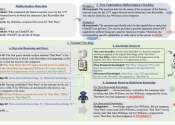A language is a system for encoding information. In its most common use, the term refers to so-called "natural languages" — the forms of communication considered peculiar to humankind. In linguistics the term is extended to refer to the human cognitive facility of creating and using language. Essential to both meanings is the systematic creation and usage of systems of symbols—each referring to linguistic concepts with semantic or logical or otherwise expressive meanings.
The most obvious manifestations are spoken languages such as English or Spoken Chinese. However, there are also written languages and other systems of visual symbols such as sign languages.
Although some other animals make use of quite sophisticated communicative systems, and these are sometimes casually referred to as animal language, none of these are known to make use of all of the properties that linguists use to define language in the strict sense.
When discussed more technically as a general phenomenon then, "language" always implies a particular type of human thought which can be present even when communication is not the result, and this way of thinking is also sometimes treated as indistinguishable from language itself.
In Western Philosophy for example, language has long been closely associated with reason, which is also a uniquely human way of using symbols. In Ancient Greek philosophical terminology, the same word, logos, was used as a term for both language or speech and reason, and the philosopher Thomas Hobbes used the English word "speech" so that it similarly could refer to reason, as will be discussed below.




